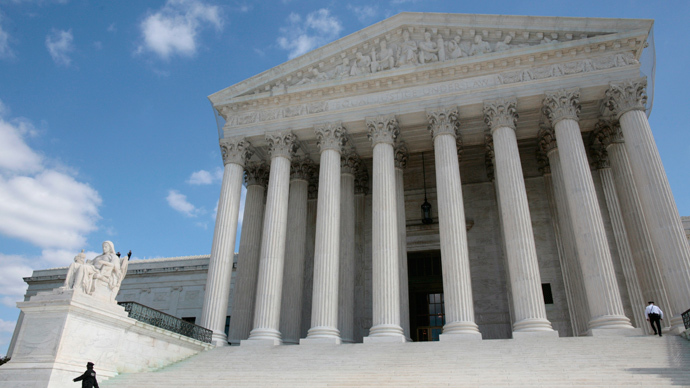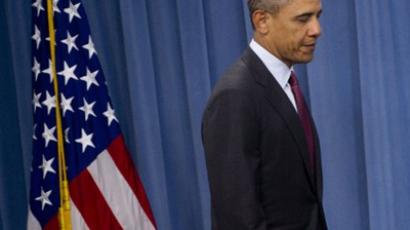Supreme Court to rule on fate of indefinite detention for Americans under NDAA

The United States Supreme Court is being asked to hear a federal lawsuit challenging the military’s legal ability to indefinitely detain persons under the National Defense Authorization Act of 2012, or NDAA.
According to Pulitzer Prize-winning journalist Chris Hedges — a co-plaintiff in the case — attorneys will file paperwork in the coming days requesting that the country’s high court weigh in on Hedges v. Obama and determine the constitutionality of a controversial provision that has continuously generated criticism directed towards the White House since signed into law by President Barack Obama almost two years ago and defended adamantly by his administration in federal court in the years since.
Should the Supreme Court reject the plaintiffs’ plea, Hedges said it could signal the “obliteration of our last remaining legal protections.”
With the inking of his name to the annual Pentagon spending bill nearly two years ago, President Obama awarded his military the power to imprison persons suspected of ties to terrorist groups until the vaguely-defined “end of hostilities.”
Journalists and human rights workers were among those to immediately oppose the Dec. 31, 2011 signing of the NDAA — and one provision in particular, Section 1021(e) — because they said the US government could manipulate the law in order to detain anyone alleged to have “substantially supported” a group that’s considered an enemy of America, without trial, until the end of persistent and consistently expanding warfare.
“I have had dinner more times than I can count with people whom this country brands as terrorists … but that does not make me one,” Hedges, a long-time war correspondent for the New York Times, said when the suit was first filed in federal court in early 2012.
In an editorial published by Hedges on Monday, he wrote that he has been detained numerous times during his decades as a foreign correspondent, and in those instances was illegally held by the US government.

“In those days there was no law that could be used to seize and detain me,” he wrote. “Now there is.”
Last year, US District Judge Katherine Forrest of the Southern District of New York said Section 1021 was unconstitutional and ordered an immediate stay on the provision. Without delay, however, the Obama administration filed an appeal which was honored this past July when the US Court of Appeals for the Second Circuit sided with the White House and ruled 3-to-0 that the American co-plaintiffs could not challenge the NDAA because they lacked standing.
The appellate court decided with that ruling that US citizens couldn’t fight Section 1021 in court because, “with respect to citizens, lawful resident aliens, or individuals captured or arrested in the United States, Section 1021 simply says nothing at all.”
“The court, in essence, said that because it did not construe the law as applying to US citizens and lawful residents we could not bring the case to court,” Hedges wrote this week in his op-ed.
But according to Hedges and at least one member of his legal team, the court should be clearer and opine precisely in a manner which ensures American citizens cannot be placed in indefinite military custody.
“The problem is by saying there’s no standing,” attorney Bruce Afran told Hedges, “they deprive the district court of entering an order, saying and declaring that the statue does not apply to US citizens or permanent residents, lawful residents in the US.”
“We have the absurdity of the court of appeals, one of the highest courts in the country, saying this law cannot touch citizens and lawful residents, but depriving the trial court of the ability to enter an order blocking it from being used in that way,” Afran told Hedges. “The lack of an order enables future [military] detentions. A person may have to languish for months, maybe years, before getting a court hearing. The [appellate] court correctly stated what the law is, but it deprived the trial court of the ability to enter an order stopping this [new] law from being used.”
Last year, Hedges suggested during a question-and-answer session on Reddit.com that the Obama administration may be defending Section 1021 so adamantly in federal court because it is already being used. If so, Hedges added this week, negating the power provided in that provision could lead the president to be found in contempt of court.
“If the Obama administration simply appealed it, as we expected, it would have raised this red flag,” Hedges said in 2012. “But since they were so aggressive it means that once Judge Forrest declared the law invalid, if they were using it, as we expect, they could be held in contempt of court. This was quite disturbing, for it means, I suspect, that US citizens, probably dual nationals, are being held in military detention facilities almost certainly overseas and maybe at home.”
This week Hedges wrote, “If Section 1021 stands it will mean
that more than 150 years of case law in which the Supreme Court
repeatedly held the military has no jurisdiction over civilians
will be abolished.”
“It will mean citizens who are charged by the government with
‘substantially supporting’ al-Qaida, the Taliban or the nebulous
category of ‘associated forces’ will be lawfully subject to
extraordinary rendition. It will mean citizens seized by the
military will languish in military jails indefinitely, or in the
language of Section 1021 until ‘the end of hostilities’—in an age
of permanent war, for the rest of their lives,” Hedges added.
When Pres. Obama signed the NDAA on New Year’s Eve, he added a statement in which he swore he wouldn’t use the military detention provision against Americans. Given recent revelations regarding his administration, however, another member of Hedges’ legal counsel told the journalist that he isn’t so certain that will stand true.
“First the terrorism-industrial complex assured Americans that they were only spying on foreigners, not US citizens,” Hedges quoted from another attorney on the case, Carl Mayer. “Then they assured us that they were only spying on phone calls, not electronic communications. Then they assured us that they were not spying on American journalists. And now both [major political] parties and the Obama administration have assured us that they will not detain journalists, citizens and activists”
Hedges has already been detained by the US, Hedges added, while recalling the case of Laura Poitras, an American filmmaker who also claims to have been repeatedly held and interrogated by federal officials during years of investigative work. Poitras has most recently collaborated with the Guardian’s Glenn Greenwald on digesting the National Security Agency leaks attributed to former intelligence contractor Edward Snowden that have aided in disproving some of the promises already made by the Obama administration, as referenced by Carl Mayer.
Hedges is joined in the suit by a handful of plaintiffs, including Pentagon Papers whistleblower Daniel Ellsberg, writer Noam Chomsky and independent journalist Alexa O’Brien. When the case was first brought before Judge Forrest last year, O’Brien testified that federal contractors attempted to link a group she co-founded, US Day of Rage, with Islamic organizations in an attempt to discredit, and perhaps detain, her.
O’Brien said she had interviewed former Guantanamo Bay detainees
as part of her work as a journalist and feared that those
conversations could be construed as giving “substantial
support” to terrorist groups of “associated forces,”
as described in the NDAA.
After Pres. Obama authorized the NDAA, O’Brien said in court,
“I am now fearful of doing the type of reporting that I have
done on individuals and organizations that are considered
terrorists by the United States government and my reporting has
therefore been curtailed.”
“I have an actual and well-founded fear that the US Government will consider me a covered person under the [NDAA] and will either detain me indefinitely or subject me to a military tribunal,” she said in a sworn statement filed March 12, 2012. “Because of this fear I have substantially curtailed my journalistic and political activities.”
Joining Hedges, Ellsberg, Chomsky and O’Brien in the lawsuit are Icelandic parliamentarian Birgitta Jónsdóttir, RevolutionTruth founder Tangerine Bolen, Occupy London activist Kai Wargalla and Dr. Cornel West. In the appeals ruling from July, the court said, “While Section 1021 does have meaningful effect regarding the authority to detain individuals who are not citizens or lawful resident aliens and are apprehended abroad, Jónsdóttir and Wargalla have not established standing on this record.”
According to Hedges, the Supreme Court only accepted around 100 of the 8,000-or-so requests it receives each year. “If we fail, if this law stands, if in the years ahead the military starts to randomly seize and disappear people, if dissidents and activists become subject to indefinite and secret detention in military gulags, we will at least be able to look back on this moment and know we fought back,” he wrote.














